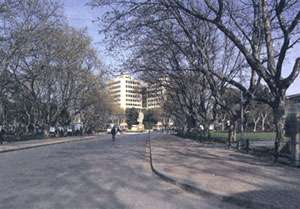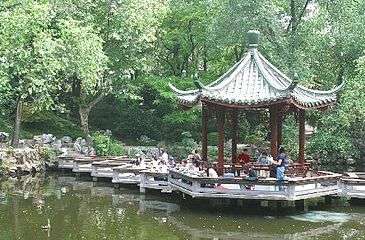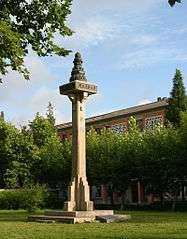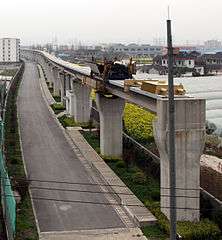Tongji University
| 同济大学 | |
 | |
| Motto | 同舟共济[1] |
|---|---|
| Type | National, Public |
| Established | October 1, 1907 |
| President | Dr. Zhong Zhihua (钟志华) |
Academic staff | 2,770 |
| Students | 35,840 |
| Undergraduates | 17,474 |
| Postgraduates | 18,366 |
| Location | Shanghai, China |
| Campus |
Siping Road Campus (1239 Siping Road, Yangpu District, Shanghai, 200092) Jiading Campus (4800 Caoan Road, Jiading District, Shanghai, 201804) |
| Colors | |
| Website |
简体中文 English Deutsch |
Tongji University (simplified Chinese: 同济大学; traditional Chinese: 同濟大學; pinyin: Tóngjì Dàxué), colloquially known as Tongji (同济, Tóngjì), is a comprehensive university located in Shanghai. Established in 1907 by the German government together with German physicians in Shanghai, Tongji is one of the oldest and most prestigious universities in China.
Tongji University is especially renowned for its engineering, business and architecture programs; its civil engineering department has consistently ranked first in China for decades. The School of Economics and Management (Tongji SEM) is one of 74 business schools in the world being triple accredited by the European Quality Improvement System (EQUIS), the Association to Advance Collegiate Schools of Business (AACSB) and the Association of MBAs (AMBA).[2] Tongji University is a member of the Yangtze Delta Universities Alliance and Asian-European Laotse Universities Network.[3] Tongji University is ranked 75th in the 2017 Reuters Asia Pacific's Most Innovative University ranking.[4]
History
The history of Tongji University can be traced back to 1907 when the German Medical School for the Chinese in Shanghai was founded by the German government together with the German physicians Erich Paulun, Oscar von Schab and Paul Krieg. The school was affiliated with the Tongji-Hospital the German physicians had established in Shanghai on the initiative of Paulun.[5] The name Tongji[6] suggests cooperating by riding the same boat. The school was expanded to include engineering in its programs and got its new name as German Medical and Engineering School for the Chinese in Shanghai in 1912.[7] It was formally established as a Chinese university under the name of Tongji University in 1923/1924 and was renamed as National Tongji University in 1927. During the Second Sino-Japanese War (1937–1945), the university campus was moved from Shanghai first to Zhejiang Province, then to Jiangxi Province and Yunnan Province and later to Sichuan Province. It was eventually moved back to Shanghai in 1946.[8] It then grew to be a comprehensive university which offered programs in science, engineering, medicine, arts, and law. Following a nationwide campaign of reorganizing schools and departments between universities in 1952, Tongji University became a university knowns for its civil engineering and architecture programs. Tongji is also the first university that introduced Urban Planning into China. In 1952, the first twelve full professors of Tongji are: 李国豪(Li Guohao), 周念先(Zhou Nianxian), 钱仲毅(Qian Zhongyi), 陈超(Chen Chao), 周方白 (周圭), 李寿康, et al.
As a university which had established a reputation for its research, Tongji became one of the first batch of universities which were authorized by the China State Council to establish its Graduate School. As one of the leading universities, it was successful in its application for the 211 Program which provided universities with substantial government fund. In 1995, the university became one to be jointly supported by the State Education Commission and the Shanghai Municipal Government. In 1996 the university merged with Shanghai Institute of Urban Construction and Shanghai Institute of Building Materials. The merger was acknowledged by the State Council as "Tongji Model" in the system renovation of higher institutions in China. In April 2000, the expanded Tongji merged again with Shanghai Railway University. Now Tongji University has become a comprehensive university which offers a wide range of programs in science, engineering, medicine, arts, law, economics and management.[9]
Timeline
- November 2010 - Signed a cooperation agreement with Instituto Superior Técnico making IST the Portuguese Campus of Tongji University
- July 2005 - Signed a cooperation agreement with Politecnico di Milano and Politecnico di Torino concerning the development of Sino-Italian University Campus in Shanghai and establishment of a Sino-Italian House, one year later a dual bachelor's degree project in engineering, called PoliTong, was launched
- 2002 - Listed in Project 985
- April 2000 - Merged with Shanghai Railway University (a merge between Shanghai Railway College and Shanghai Railway Medical College in May 1995)[10][11][12]
- August 1996 - Merged with Shanghai Institute of Urban Construction and Shanghai Institute of Building Materials
- November 1995 - Listed in Project 211
- October 1995 - Declared to be jointly built by the former State Education Commission and the Shanghai Municipal Government
- December 1978 - Upon consent by the State Council, resumed connection with Germany and became the window of the cultural, technology and science exchanges between China and Germany
- February 1972 - Tongji University merged with the Marine Geology Department of East China Normal University
- 1952 - The Departments of Mathematics, Physics and Chemistry in College of Science merged into Fudan University, the Departments of Machinery, Electrical Engineering and Ship Manufacture merged into Shanghai Jiaotong University. In the meanwhile, Tongji University merged the Civil Engineering Department and School of Architecture from Saint John's University, Shanghai and several other universities.
- 1951 - The Department of Biology in College of Science merged into East China Normal University, the Medical School and the Department of Survey in College of Engineering moved to Wuhan, Hubei Province
- September 1949 - College of Literature and Arts, College of Law merged into Fudan University
- June 1949 - Tongji University was taken over by Shanghai Military Control Commission
- August 1946 - College of Science expanded as College of Literature and Science moved back to Shanghai
- April 1946 - Moved back to Shanghai
- 1945 - Established the College of Law
- October 1940 - Moved Lizhuang in Yibin, Sichuan Province
- Winter 1938 - Moved to Kunming, Yunnan Province
- September 1937 - Moved to the south of China due to the Second Sino-Japanese War
- August 1927 - Renamed as National Tongji University
- May 20, 1924 - Approved by the government to be one of the first national universities in China.
- March 1922 - Renamed as Tongji Medical and Engineering University
- October 1907 - Established as Tongji German Medical School[13]
Present
The university now registers over 50,000 students at all levels from certificate and diploma courses to Bachelor's Degrees, Master's, Ph.D. programs and post doctoral attachments. There are over 4,200 academic staff for teaching and/or research, among whom there are 6 Members of Chinese Academy of Science, 7 Members of Chinese Academy of Engineering, over 530 professors and 1,300 associate professors. The university offers diverse courses in its 81 Bachelor's degrees, 151 Masters, 58 PhD programs and 13 post doctoral mobile stations. Tongji University is particularly famous for its Civil Engineering and Architecture programs. Its Civil Engineering, Architecture programs and Transportation Engineering are ranked Top 1 in P.R. China and its architecture program is by far the most difficult to gain entry into. As one of the state leading centers for scientific research, the university has 5 state key laboratories and engineering research centres.
The university is active in promoting cooperation and exchanges with other countries. It has established links with Australia, Austria, Canada, Finland, France, Germany, Japan, Spain,[14] Switzerland, UK and USA in the fields of education, science, technology and economics. A number of international joint programs have been established between the university and its counterparts in other countries in recent years. In 2006, the university enrolled 1,829 international students.[15]
Anniversary Day
On June 3, 1907, German Medical School was opened in Shanghai. On October 1 of the same year, a ceremony was held. The Anniversary Day was initially set to May 18, on which day in 1924 the Wusong campus was opened. In 1925 and 1926, ceremonies were held on May 18. On the staff meeting on January 19, 1931, the Anniversary Day of National Tongji University was decided to be postponed to May 20, two days after the national mourn with half-mast over the death of Mr. Chen Yingshi(Chen Qimei),a politician.[16] Tongji celebrates the Anniversary Day on May 20 since then.
Coincidentally, on May 20 of 1924, Tongji Medical School was approved to be a "university" by the Department of Education of China. At that moment, both the medical school and the engineering school were approved.
Campus
Tongji University is titled the State-level Garden Unit for Excellent Afforestation. lts five campuses are located in the municipal city of Shanghai, covering an area of 2,460,000 m². The Siping Campus is situated on Siping Road; the West Campus on Zhennan Road; the North Campus on the Gonghexing Road; the East Campus on Wudong Road and the Jiading Campus is located in Shanghai International Automobile City in Anting, Jiading District. In the year 2009, the East Campus was sold to Shanghai University of Finance and Economics.[17]
- Siping Campus (Main campus)
 The entrance part of Siping campus
The entrance part of Siping campus The Sanhao Wood (三好坞) in Siping campus
The Sanhao Wood (三好坞) in Siping campus The north teaching building (北楼) in Siping campus
The north teaching building (北楼) in Siping campus The huabiao (华表) in Siping campus
The huabiao (华表) in Siping campus The Qianqiu (千秋) Garden in Siping campus
The Qianqiu (千秋) Garden in Siping campus Maglev
Maglev Maglev Test track
Maglev Test track
- West Campus
- North Campus
- Jiading Campus
Academics
Colleges, schools and departments
- College of Architecture and Urban Planning
- College of Civil Engineering
- College of Design and Innovation
- Law School
- School of Software Engineering
- College of Electronics and Information Engineering
- College of Environmental Science and Engineering
- School of Material Science and Engineering
- College of Mechanical Engineering
- College of Transportation Engineering
- College of Automotive Engineering
- School of Aerospace Engineering and Applied Mechanics
- School of Physics Science and Engineering
- School of Chemical Science and Engineering
- School of Mathematics
- School of Foreign Languages
- School of Humanities
- School of Economics and Management
- College of Arts and Media
- College of Life Science and Technology
- School of Ocean and Earth Science
- Medical School
- Institute of Rail Transit
Institutes and centres
- Intellectual Property Institute
- The Institute for Biomedical Engineering & Nano Science (iNANO)
- Institute of Further Education
- Institute of E-Education
- Institute of Higher Technology
- Institute of Vocational and Technical Education
- Institute of Automobile Marketing
- German Academic Centre
- Sino-German College
- Sino-German College of Engineering
- Sino-French College of Engineering and Management
- Sino-Italian Campus
- UNEP-Tongji Institute for Environment and Sustainable Development (IESD)
- Architectural Design and Research Institute
- Research Institute of Modern Agricultural Science and Engineering
- The International School of Tongji University
- Centre for Asia-Pacific Studies
State key laboratories
- State Key Laboratory of Disaster Prevention in Civil Engineering
- State Key Laboratory of Pollution Control and Resource Reuse
- State Key Laboratory of Modern Technology of Urban Planning and Design
- State Key Laboratory of Marine Geology
National research centre
- National Engineering Research Centre of Urban Pollution Control
Key provincial-level and ministerial-level laboratories
- Key Laboratory of Road and Traffic Engineering of the State Ministry of Education
- Key Laboratory of Yangtze Water Environment of the State Ministry of Education
- Shanghai Key Laboratory of Metal Function Materials Research and Application
- Key Laboratory of Modem Engineering Geodesy of The State Bureau of Surveying and Mapping
- Open Laboratory of Physiological and Psychology in Railway Health Care
- Open Laboratory of Clinical Medical Molecular Biology in Railway Health Care
- Open Laboratory of Nutrition and Food Hygiene in Railway Health Care
- Open Laboratory of Children’s Stomatology in Railway Health Care
- Open Laboratory of Venereology in Railway Health Care
Key provincial-level and ministerial-level research centres
- Information and Technology Research Centre of Civil Engineering of the State Ministry of Education
- Shanghai Engineering Research Centre of Constriction Robot[18]
State key disciplines
- Marine Geology
- Structural Engineering
- Engineering Mechanics
- Bridge and Tunnel Engineering
- Material Science
- Road and Railway Engineering
- Urban Planning and Design
- Traffic and Transportation Planning and Management
- Environmental Engineering
- Geo-technical Engineering[19]
Members of the Chinese Academy of Science
- Sun Jun (孙钧)
- Ma Zaitian (马在田)
- Wang Pinxian (汪品先)
- Yao Xi (姚熹)
- Zheng Shiling (郑时龄)
- Chang Qing(常青)
- Zhou Xingming(周兴铭)
- Chen Yihan(陈义汉)
- Pei Gang (裴钢)
Members of the Chinese Academy of Engineering
- Xiang Haifan (项海帆)
- Li Tongbao (李同保)
- Guo Chongqing (郭重庆)
- Dai Fudong (戴复东)
- Fan Lichu (范立础)
- Lu Yaoru (卢耀如)
- Shen Zuyan (沈祖炎)[20]
- Zhong Zhihua(钟志华)
Presidents

- Erich Paulun (埃里希.宝隆) (1907-1909)
- Oscar von Schab (福沙伯) (1909-1917)
- Berrens (贝伦子) (1912-1919&1921-1927)
- Shen Engfu (沈恩孚) (1917-1923) (Acting)
- Yuan Xitao (袁希涛) (1923-1927) (Acting)
- Ruan Shangjie (阮尚介) (1917-1927)
- Zhang Zhongsu (张仲苏) (1927-1929)
- Zhang Qun (张群) (1929.3-1929.6)
- Hu Shuhua (胡庶华) (1929-1932)
- Weng Zhilong (翁之龙) (1932-1939)
- Zhao Shiqing (赵士卿) (1939-1940)
- Zhou Junshi (周均时) (1940-1942)
- Ding Wenyuan (丁文渊) (1942-1944)
- Xu Songming (徐诵明) (1944-1946)
- Dong Xifan (董洗凡) (1946-1947)
- Ding Wenyuan (丁文渊) (1947-1948)
- Xia Jianbai (夏坚白) (1948-1952)
- Xue Shangshi (薛尚实) (1953.1-1959.7)
- Wang Tao (王涛) (1959-1977)
- Li Guohao (李国豪) (1977.10-1984.4)
- Jiang Jingbo (江景波) (1984.4-1989.2)
- Gao Tingyao (高廷耀) (1989.2-1995.2)
- Wu Qidi (吴启迪) (1995.2-2003.7)
- Wan Gang (万钢) (2003.7-2007.8)
- Pei Gang (裴钢) (2007.8-2016.9)[21]
- Zhong Zhihua(钟志华)(2016.9-)
Noted alumni
Some noted alumni of Tongji University are:
- Li Guohao (李国豪), Former President of Tongji University, World Famous Bridge Expert
- Wang Shu (王澍), 2012 Pritzker Prize recipient
- Ni Chao (倪超), Former president of the National Cheng Kung University
- Qiao Shi (乔石), Former Chairman of the Standing Committee of the National People's Congress, PRC
- Qian Xinzhong (钱信忠), Minister of Health of the People's Republic of China
- Li Jincheng (李金城), Chief Engineer of the Qingzang railway Project
- Tang Dengjie (唐登杰), Former Vice Mayor of Shanghai
- Chen Chongzhou (陈从周), Architect
- Qiu Fazu (裘法祖), Surgeron
- Wu Zhongbi (武忠弼), Physiologist
- Wu Mengchao (吴孟超), Surgeron, Winner of the State Preeminent Science and Technology Award of China (2005)
- Pan Yunhe (潘云鹤), Computer Scientist, Vice Chairman of the Chinese Academy of Engineering
- Bei Shizhang (贝时璋), Physiologist, "Father of Chinese Biophysics"
- Tang Youqi(唐有祺),Chemist
- Boqiang Liang (梁伯强), Pathologist
- Qinzhen Shen (沈其震), Physiologist
- Zhu Hongyuan (朱洪元), Physical Scientist
- Wu Zhiqiang (吴志强), Chief Planning Officer for the Shanghai Expo 2010
- Wan Gang (万钢), Minister of Science and Technology of the People's Republic of China
- Rao Bin (饶斌), Main Founder of China Modern Automobile Industry
- Xie Guozhong (谢国忠), Economist
- Wang Guangtao (汪光焘), Minister of Construction of the People's Republic of China[22]
- Kwong-Chai Chu (朱光彩), a hydraulic engineer
See also
References
- ↑ "同济大学章程 (Chinese)" (PDF). Tongji University. Retrieved December 22, 2014.
- ↑ http://www.mba.today/guide/triple-accreditation-business-schools/page2
- ↑ http://www.laotse.vo.tum.de/Laotse/HTML/10-11.HTML
- ↑ http://www.reuters.com/innovative-universities-asia-2017/profile?uid=75
- ↑ See Roswitha Reinbothe (ed.), Tongji-Universität in Shanghai. Dokumente zur Gründungsgeschichte, Wiesbaden: Harrassowitz 2009.
- ↑ Tongji is the Chinese (Shanghai dialect) phonetic approximation of deutsche (German).
- ↑ The degrees granted by the German Medical College in Shanghai corresponded to the degrees granted by medical schools in Germany.
- ↑ With a few exceptions, the German members of the Faculty of Medicine stayed behind in Shanghai and established in 1940 in the International Settlement the Shanghai German Medical Academy (Deutsche medizinische Akademie Shanghai; alternative spelling Schanghai). The school functioned at 82 Tongfu Road (later Shimenyi Road) and at #10, 100 Changshu Road, continuing medical and educational activities throughout the war. Upon the return of the National Tongji University to Shanghai, the Academy, with all its students, was re-integrated in the Faculty of Medicine. See (History of) #10, 100 Changshu Road (Shanghai), in Chinese.
- ↑ tongji history
- ↑ http://www.360doc.com/content/14/0327/22/9737138_364276412.shtml
- ↑ http://www.baidu.com/link?url=gsct8gvvyKnDw3neAJUtHKzI14N09TSYixxIb5LP1HfAMDXrkoSWoLHwqk-ksbzL
- ↑ http://med.tongji.edu.cn/article.asp?article_id=6392&category_id=2149&root_id=41
- ↑ Chronology of Tongji University
- ↑ http://www.guninetwork.org/guni.network/institutional-members-news/upc-and-upm-open-a-campus-at-tongji-university-in-shanghai
- ↑ Today
- ↑ Minutes of staff meetings of National Tongji University, Tongji Archives.
- ↑ 上海财经大学武东路100号揭牌仪式隆重举行, (In Chinese).
- ↑ Research
- ↑ Key Disciplines
- ↑
- ↑ Former Presidents
- ↑ Alumni
External links
- Official website
- Tongji.net
- Tongji university school of medicine
- Tongji @ MITBBS
- Centennial Anniversary
- Centenary Celebration of Tongji University
- Tongji University Alumni Association
- Tongji University Alumni Association of Germany
- Tongji University Alumni Association of America
- Tongji University Alumni Singapore
- Tongji University Hong Kong Alumni Association
- Tongji University
- Tongji University Image Library
- Tongji University Three-dimensional map
Coordinates: 31°16′58″N 121°30′24″E / 31.2827°N 121.5066°E


